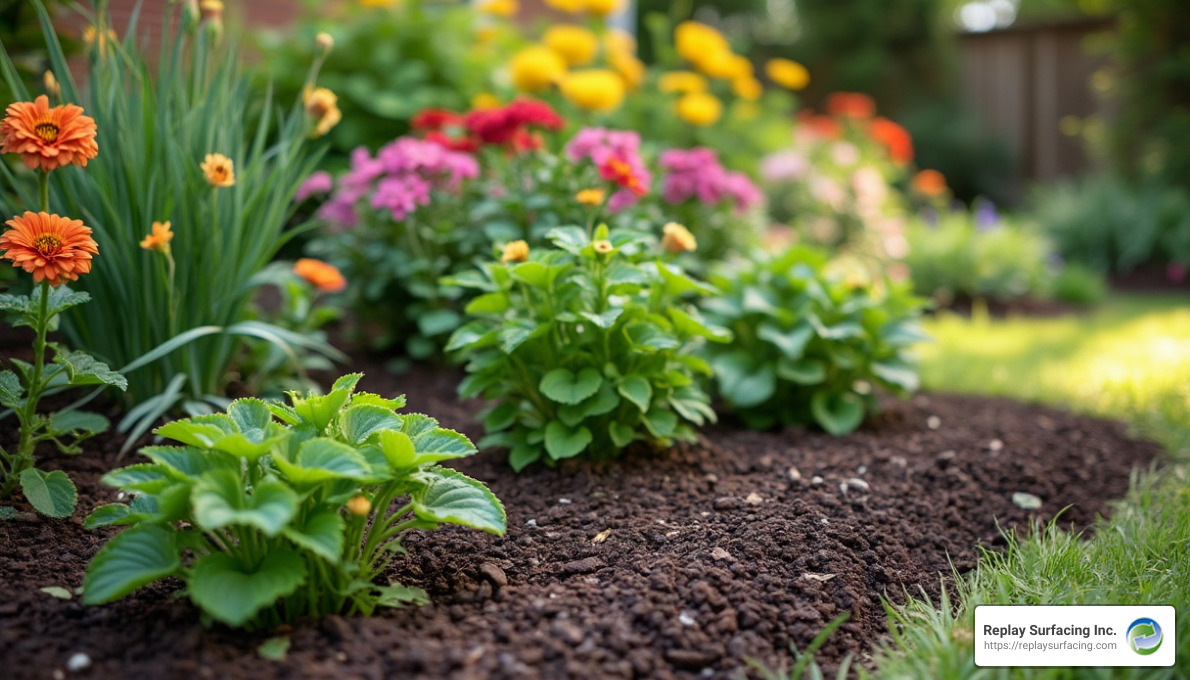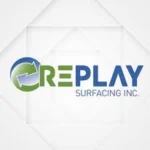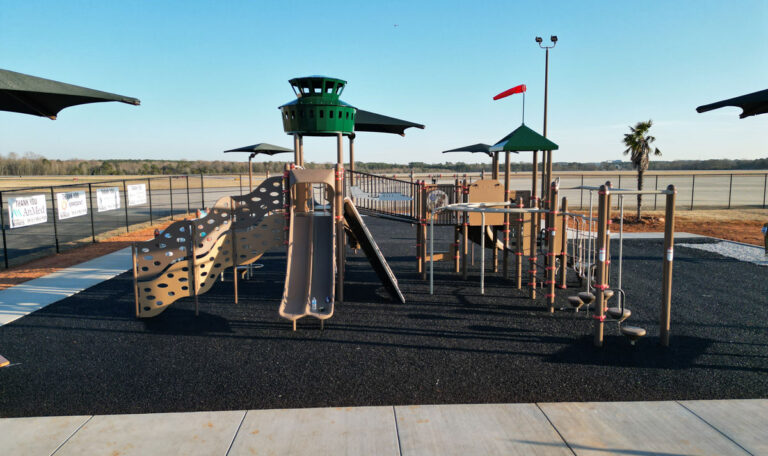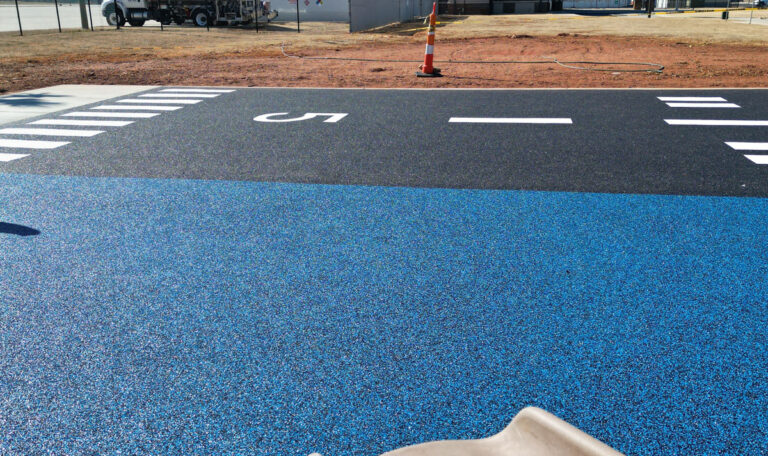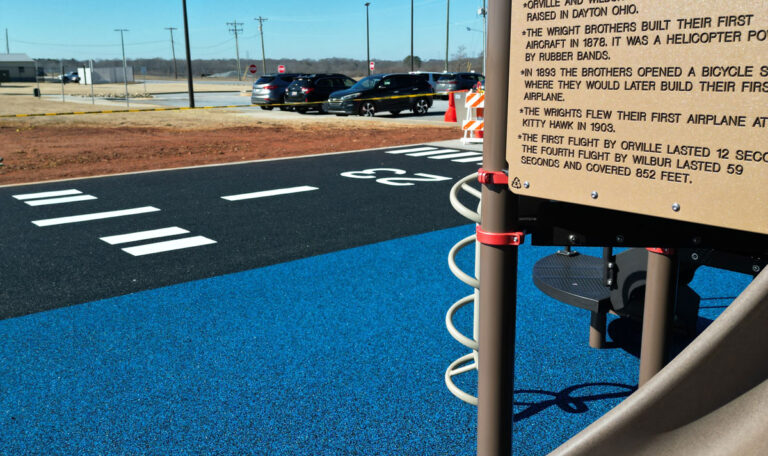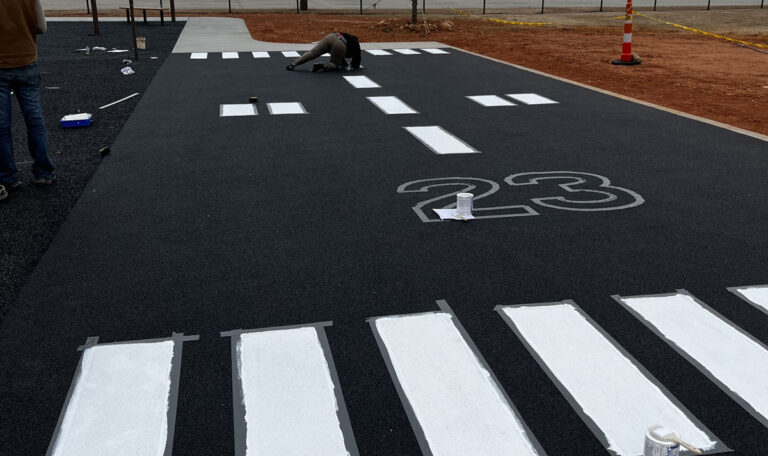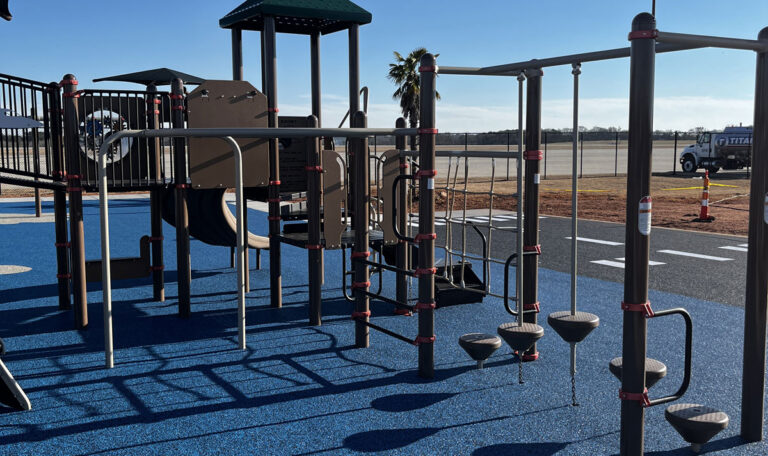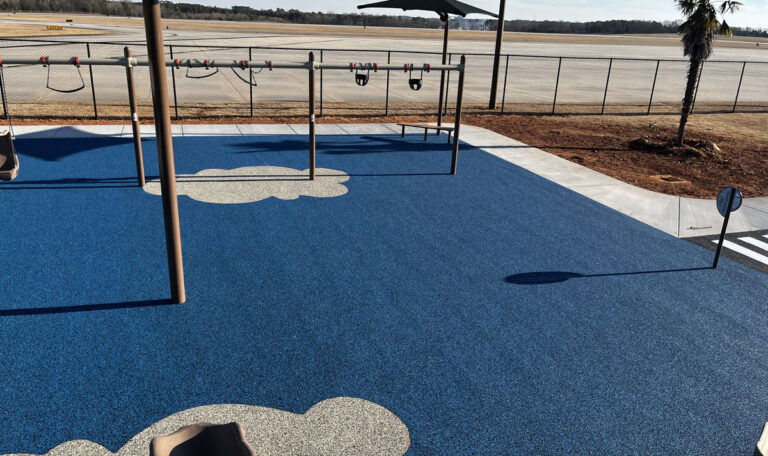Recycled rubber mulch is an innovative and eco-friendly solution that transforms waste into a valuable resource for your garden. Derived from discarded tires, this type of mulch offers a sustainable way to reduce landfill waste while providing numerous practical benefits for landscaping. Its popularity stems from its durability, low maintenance, and ability to keep weeds at bay. Plus, it doesn’t attract pesky insects. If you’re searching for an environmentally conscious option that stands the test of time, recycled rubber mulch may just be the answer for you.
- Sustainability: Uses recycled tires, reducing landfill waste.
- Durability: Lasts longer than organic mulch, up to 20 years.
- Eco-Friendly: Non-decomposition means it doesn’t contribute to soil pollution.
I’m Landon Olson, owner of Replay Surfacing, and I have dedicated my career to turning environmental challenges into sustainable solutions. With experience in utilizing recycled rubber mulch, I am passionate about creating landscapes that are both beautiful and eco-friendly. Let’s explore more about the advantages of this innovative mulch and how it aligns with your sustainability goals.

What is Recycled Rubber Mulch?
Recycled rubber mulch is a type of mulch made from discarded tires. Every year, approximately 290 million scrap tires are thrown away, creating a massive waste problem. By changing these tires into mulch, we not only help reduce landfill waste but also provide an eco-friendly solution for landscaping.
Unlike traditional organic mulches made from wood or bark, recycled rubber mulch is inorganic. This means it doesn’t break down over time, making it a long-lasting option for gardens and playgrounds. Its longevity is one of its biggest advantages, lasting up to 20 years without needing replacement.
Some people refer to it as artificial mulch because it’s made from synthetic materials rather than natural ones. Despite this, it has a texture that mimics the look of wood mulch, adding aesthetic value to gardens and play areas.

Using recycled rubber mulch is a smart choice for those who want a sustainable and practical landscaping option. It helps keep weeds at bay, is resistant to pests, and doesn’t require frequent maintenance. Additionally, because it’s heavier than organic mulch, it stays in place during heavy rain or strong winds, making it an excellent choice for areas prone to harsh weather conditions.
In summary, recycled rubber mulch is a durable, sustainable, and eco-friendly alternative to traditional mulches. It’s perfect for those looking to reduce their environmental impact while enjoying the benefits of a low-maintenance garden or playground surface.
Benefits of Recycled Rubber Mulch
Recycled rubber mulch offers several standout benefits that make it a popular choice for gardeners and homeowners looking for an eco-friendly and efficient landscaping solution.
Low Maintenance
One of the most appealing features of recycled rubber mulch is its low maintenance nature. Unlike organic mulches that decompose and need regular replacement, rubber mulch maintains its form and color for up to 20 years. This longevity means less time and money spent on upkeep, allowing you to enjoy your garden without constant care.
Weed Suppression
Rubber mulch is highly effective at suppressing weeds. It blocks sunlight from reaching the soil, preventing weed seeds from germinating. This creates a cleaner, more attractive garden and reduces the need for chemical weed killers, making it a healthier choice for your landscape.
Pest Resistance
Unlike wood-based mulches, rubber mulch is not an inviting home for insects like termites or carpenter ants. This pest resistance means fewer bugs eating away at your plants or nesting near your home, allowing for a more pleasant and less pest-ridden garden experience.
Longevity
The longevity of recycled rubber mulch is one of its most significant advantages. It doesn’t break down over time, so it remains effective for years. This durability makes it a cost-effective choice in the long run, as it doesn’t need to be replaced as frequently as organic mulch.
Safety
Safety is a key benefit of using rubber mulch, especially in playgrounds. Its soft, cushioned texture provides a safer surface for children, reducing the risk of injuries from falls. This makes it an ideal choice for play areas where safety is a priority.
Overall, recycled rubber mulch is a practical, durable, and eco-friendly option for anyone looking to improve their garden or playground. It offers the perfect combination of aesthetics, functionality, and sustainability.

Drawbacks of Recycled Rubber Mulch
While recycled rubber mulch has many benefits, it’s important to consider some potential drawbacks before choosing it for your garden.
Toxicity Concerns
One major concern is the potential toxicity of rubber mulch. According to research, rubber mulch can leach harmful chemicals like zinc and other metals, which can affect plants and soil health. Dr. Linda Chalker-Scott from Washington State University highlights that rubber leachate contains various metals, including zinc, which can be toxic to plants and small organisms in aquatic environments. This makes it crucial to assess the specific needs and sensitivities of your garden before using rubber mulch.
Flammability
Another significant drawback is its flammability. Studies, like the one from the University of Nevada Cooperative Extension, have shown that rubber mulch can be highly flammable. It tends to produce higher flame heights and temperatures compared to organic mulches. This makes it a potential fire hazard, especially in areas prone to wildfires or near structures that could be at risk in case of a fire.
Non-Nutrient
Unlike organic mulches, rubber mulch does not decompose and therefore does not enrich the soil with nutrients. This non-nutrient characteristic means that while it is excellent at weed suppression, it doesn’t contribute to the fertility of the soil. Gardeners looking to improve soil health may need to supplement with other organic materials or fertilizers.
Environmental Impact
The environmental impact of recycled rubber mulch is another point of concern. While it repurposes waste tires, which is a positive step towards sustainability, the decomposition of rubber mulch can release harmful additives into the environment over time. Some microbes and fungi can break down these materials, potentially introducing toxins into the soil and surrounding ecosystem.
Understanding these drawbacks can help you make an informed decision about whether recycled rubber mulch is the right choice for your gardening needs. Balancing its benefits with these considerations ensures that your garden remains both beautiful and environmentally conscious.
How to Use Recycled Rubber Mulch in Your Garden
Using recycled rubber mulch in your garden can be a smart choice if you follow some simple tips. Here’s how to get the most out of this durable and low-maintenance mulch.
Installation Tips
Installing rubber mulch is straightforward. Begin by clearing the area of any existing weeds or debris. This ensures a clean slate for your mulch. Level the ground to create an even surface, which helps the mulch stay in place.
For added protection against weeds, consider using a weed fabric. Lay it down before adding the mulch. This acts as a barrier, preventing stubborn weeds from poking through.
Spread the rubber mulch evenly over the desired area. A layer about 2-3 inches thick is usually sufficient for most garden beds. This thickness helps with weed suppression and provides a soft cushion for walking paths or play areas.
Weed Fabric
Using a weed fabric under your mulch can significantly improve its effectiveness. This fabric blocks sunlight, which weeds need to grow. It also allows water and air to reach the soil, ensuring your plants get the nutrients they need.
When selecting a weed fabric, look for one that is durable and has good permeability. This ensures it will last and benefit your garden over time.
Color Options
One of the appealing aspects of rubber mulch is its variety of color options. You can choose from natural tones like brown and black, or go bold with colors like red or green. This allows you to match the mulch to your garden’s aesthetic or use it to create visual interest.
That while rubber mulch is known for its color retention, intense sunlight over many years can cause some fading. If maintaining vibrant color is important, consider selecting a darker shade that will age more gracefully.
Maintenance
One of the biggest advantages of recycled rubber mulch is its low maintenance. Unlike organic mulches, it doesn’t decompose, meaning you won’t need to replace it frequently. However, occasional maintenance can help keep it looking its best.
Use a leaf blower on a low setting to clear away leaves or debris without disturbing the mulch. Check the mulch periodically to ensure it’s evenly spread and hasn’t shifted.
While rubber mulch doesn’t enrich the soil, it does allow for excellent drainage and aeration. This makes it a great choice for areas where soil compaction is a concern. If soil fertility is a priority, supplement with organic fertilizers or compost to provide the necessary nutrients.
By following these tips, you can enjoy the benefits of recycled rubber mulch in your garden, from its aesthetic appeal to its practical advantages.
Frequently Asked Questions about Recycled Rubber Mulch
Is recycled rubber mulch safe for pets and children?
Safety is a top concern for any garden material, especially when pets and children are involved. Recycled rubber mulch is generally considered safe. It is non-toxic and has been tested by various organizations, including the Environmental Protection Agency (EPA). According to the EPA, rubber mulch is a suitable choice for playgrounds as it meets safety standards that help reduce injuries from falls.
While some studies have raised concerns about potential chemical exposure, such as lead, it’s important to note that these instances are relatively rare and often linked to poor-quality products. To ensure safety, always purchase mulch from reputable suppliers who adhere to safety standards.
How long does recycled rubber mulch last?
One of the standout features of recycled rubber mulch is its impressive durability. Unlike organic mulches, which decompose over time, rubber mulch can last for 10 to 20 years without needing replacement. This longevity makes it a cost-effective choice for homeowners.
Rubber mulch is also known for its excellent color retention. While it may fade slightly under intense sunlight over many years, it generally maintains its color better than organic options. Regular maintenance, like redistributing the mulch and occasional cleaning, can help preserve its appearance and functionality.
Does recycled rubber mulch affect soil quality?
A common question about recycled rubber mulch is its impact on soil quality. Since rubber mulch is inorganic, it does not decompose and add nutrients back into the soil like organic mulches do. This means it won’t improve soil fertility directly.
However, rubber mulch allows for good soil aeration and drainage, which can benefit plant roots. It prevents soil compaction, making it easier for water and air to reach the roots. If nutrient enrichment is a concern, you can supplement with organic fertilizers or compost to ensure your plants receive the necessary nutrients.
By understanding these aspects, you can make informed decisions about using recycled rubber mulch in your garden, balancing safety, durability, and soil health.
Explore our complete guide to non-toxic rubber mulch
Conclusion
Replay Surfacing Inc. is at the forefront of changing environmental challenges into sustainable solutions. By recycling tires into versatile products like recycled rubber mulch, we contribute to both environmental preservation and innovative landscaping.
Choosing recycled rubber mulch for your garden aligns with sustainable landscaping principles. This mulch not only reduces the burden of scrap tires in landfills but also offers a durable, low-maintenance alternative to organic mulches. Its ability to suppress weeds and resist pests translates to fewer chemicals and less water usage, benefiting the environment and your garden.
Moreover, rubber mulch provides a safer play surface for children, enhancing both safety and aesthetic appeal in public and private spaces. Its longevity means fewer replacements, which saves resources and reduces waste over time.
At Replay Surfacing Inc., we believe that every small step towards sustainability counts. By opting for recycled rubber mulch, you’re not just improving your garden—you’re participating in a broader movement towards a greener planet. Explore our range of sustainable products and find how you can make your space not only beautiful but also environmentally friendly.

